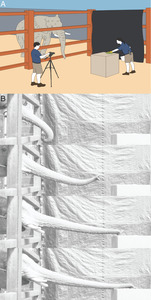Skin wrinkles and folds enable asymmetric stretch in the elephant trunk
2022
Article
hi
The elephant’s trunk is multifunctional: It must be flexible to wrap around vegetation, but tough to knock down trees and resist attack. How can one appendage satisfy both constraints? In this combined experimental and theoretical study, we challenged African elephants to reach far-away objects with only horizontal extensions of their trunk. Surprisingly, the trunk does not extend uniformly, but instead exhibits a dorsal “joint” that stretches 15% more than the corresponding ventral section. Using material testing with the skin of a deceased elephant, we show that the asymmetry is due in part to patterns of the skin. The dorsal skin is folded and 15% more pliable than the wrinkled ventral skin. Skin folds protect the dorsal section and stretch to facilitate downward wrapping, the most common gripping style when picking up items. The elephant’s skin is also sufficiently stiff to influence its mechanics: At the joint, the skin requires 13 times more energy to stretch than the corresponding length of muscle. The use of wrinkles and folds to modulate stiffness may provide a valuable concept for both biology and soft robotics.
| Author(s): | Andrew Schulz and Madeline Boyle and Colin Boyle and Sophia Sordilla and Catalina Rincon and Scott Hooper and Catie Aubuchon and Joy Reidenberg and Claire Higgins and David Hu |
| Journal: | Proceedings of the National Academices of Science |
| Volume: | 119 |
| Year: | 2022 |
| Month: | August |
| Department(s): | Haptic Intelligence |
| Bibtex Type: | Article (article) |
| Paper Type: | Journal |
| DOI: | 10.1073/pnas.2122563119 |
|
BibTex @article{Schulz22-PNAS-Elongation,
title = {Skin wrinkles and folds enable asymmetric stretch in the elephant trunk},
author = {Schulz, Andrew and Boyle, Madeline and Boyle, Colin and Sordilla, Sophia and Rincon, Catalina and Hooper, Scott and Aubuchon, Catie and Reidenberg, Joy and Higgins, Claire and Hu, David},
journal = {Proceedings of the National Academices of Science },
volume = {119},
month = aug,
year = {2022},
doi = {10.1073/pnas.2122563119},
month_numeric = {8}
}
|
|


